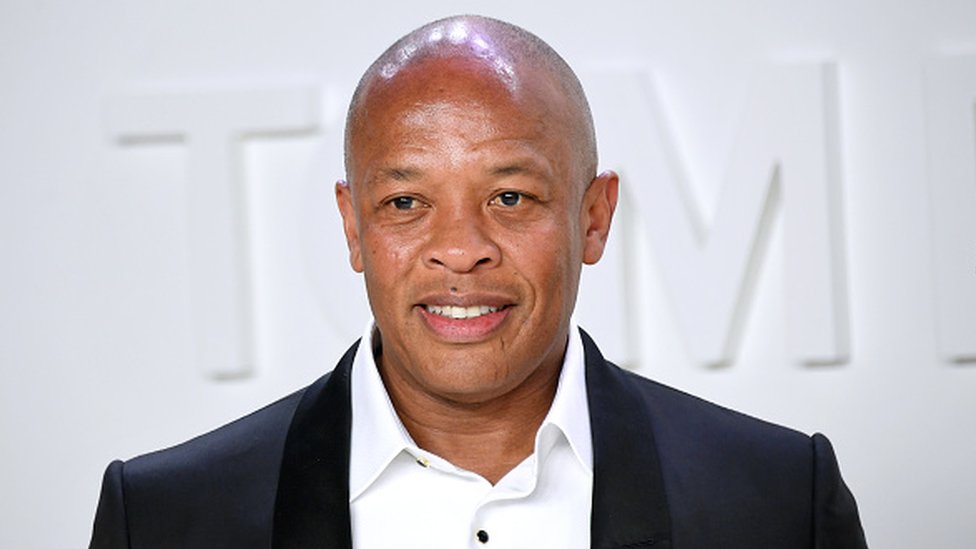Dr. Dre became a seminal figure in hip-hop through his innovative production work. In addition to establishing record labels, he built a successful career as an entrepreneur, as evidenced by the success of his consumer audio products company Beats Electronics, the maker of the popular Beats by Dre headphones.
Early Life
Dr. Dre was born Andre Romelle Young on February 18, 1965, in Los Angeles. He comes from a musical family; both of his parents were singers. His middle name, in fact, was taken from the Romells, one of the bands his father belonged to.
As a teenager, Andre looked to follow in his parents’ footsteps. After receiving a music mixer as a Christmas present in 1984, he began creating his own music by sampling and splicing together other artists’ songs.
His skills eventually led to him performing as a DJ at the Los Angeles nightclub Eve After Dark, and, later, throughout South Central Los Angeles as a member of the World Class Wreckin’ Cru. It was in this group that he took on the stage name Dr. Dre.
N.W.A.
In the second half of the ‘80s, Dr. Dre saw his profile increase dramatically as a member of N.W.A. He formed the group in 1987 with several local rappers, including Ice Cube and Easy-E. He and Easy-E formed Ruthless Records to release N.W.A.’s music.
The group released their unauthorized debut album, N.W.A. and the Posse, in 1987, quickly followed by their studio album, Straight Outta Compton, in 1988. A landmark release for the gangsta rap subgenre, Straight Outta Compton, which contained graphic depictions of inner-city life, went platinum despite receiving no commercial airplay.
Early Solo Career and Death Row Records
While Dr. Dre appeared as a rapper on N.W.A.’s albums, his most significant contributions came as a producer. In the wake of N.W.A.’s demise, those talents came to the fore on his debut solo album, The Chronic.
Released in 1992 through Death Row Records, the label he formed with Marion “Suge” Knight, The Chronic stood out for its unique blend of gangsta rap and ’70s funk, a style appropriately dubbed “G-funk.” The album went multiplatinum, and Dr. Dre took home a Grammy for its hit single “Let Me Ride.”
Along with his business savvy and musical skills, Dr. Dre also proved to have a keen eye for talent. On The Chronic, he introduced the young rapper Snoop Dogg to the world via the hit “Nuthin’ But a ‘G’ Thang.” His time at Death Row Records also saw him produce albums by some of the label’s other artists, including Tupac Shakur.
Aftermath Records and Continued Success
Dr. Dre left Death Row Records in 1996 ahead of the murder of his former labelmate Shakur and the East Coast rapper Biggie Smalls. Signing with Interscope Records, he again formed his own label, Aftermath Entertainment.
Following his first release for Aftermath, a 1996 compilation album, Dr. Dre returned in 1999 with his second solo effort, 2001. The album contained the Grammy-winning “Forgot About Dre,” which featured Eminem. Dr. Dre went on to produce Eminem’s hit albums The Slim Shady LP and The Marshall Mathers LP, released in 1999 and 2000, respectively.
In the new millennium, Dr. Dre focused on producing for artists such as Jay-Z, Mary J. Blige, and 50 Cent. He won two more Grammys in 2009 for his work with Eminem. His much-anticipated third album, Compton, arrived in 2015, the same year in which the film Straight Outta Compton, which traces the rise of N.W.A., was released.
Along with other members of N.W.A., Dr. Dre was inducted into the Rock & Roll of Fame in 2016. In 2022, he headlined the Super Bowl halftime show along with Snoop Dogg, Mary J. Blige, Eminem, Kendrick Lamar, and 50 Cent.
Business Career and Philanthropy
Dr. Dre has long demonstrated his keen business sense through his founding of record labels. In 2008, he expanded his business interests by teaming with Interscope chairman Jimmy Iovine to establish Beats Electronics.
The company, which went on to manufacture several audio products, become best known for its Beats by Dre headphones. The headphones became a cultural phenomenon in part through endorsements from celebrities like Lebron James.
In 2014 music-streaming service Beats Music launched. That same year, Apple acquired Beats Electronics as well as the Beats Music streaming service for $3 billion. It was the largest purchase the tech company had ever made. Dr. Dre himself made $620 million as part of the deal. According to Forbes, no musician had ever had a larger single-year payday.
The acquisition also saw Iovine and Dr. Dre take on executive roles with Apple. The pair’s relationship was later chronicled in the 2017 HBO documentary series The Defiant Ones. Several years earlier, they joined together as philanthropists, giving $70 million to establish an undergraduate arts, technology, and business program at the University of Southern California. More recently. Dr. Dre donated $10 million to build a performing arts center at Compton High School.

